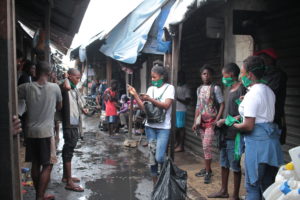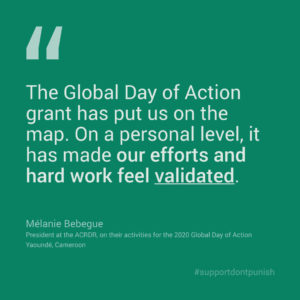This post is the second in a series featuring case studies of mobilisation from the 2020 Support. Don’t Punish Global Day of Action. We’re grateful to the ACRDR for their commitment in the face of adversity; which gives us courage and highlights the urgency of our purpose. On 26 June 2021, join us in this international show of force for sustainable alternatives to punitive drug policies. Support. Don’t Punish!
The early adoption and expansion of the Support. Don’t Punish campaign in Cameroon owes itself to the tenacity of a host of organisations and community-led networks, such as Empower Cameroon and PEP Sans Frontières, just to name a few.
This year, the Association Camerounaise pour la Réduction Des Risques liés à la consommation des drogues auprès des jeunes (ACRDR) joined the campaign’s global efforts with a number of public events.
First up, on 20 June, ACRDR organised a public debate to build common ground with people who might have never heard of drug policy reform or harm reduction: ‘Repression: Is it the solution?’.
The conversation took place in Yaoundé, the country’s capital, and saw the participation of people who use drugs and public authorities, including the National Commission for Human Rights and Freedoms, the National Committee for the Fight Against Drugs, the Ministry of Public Health and the Town Hall.
The week of activities concluded with an open fair organised on 26 June in the city of Douala, at the David Dagobert Fampou Stadium, near the New Bell prison.

Source: ACRDR
Between these two major events, ACRDR organised the distribution of masks, sanitary materials and meals to people who use drugs and live on the streets.
ACRDR is an initiative co-led by people who use drugs and one of its goals is to foster connections within the community. The organisation’s embeddedness in the community allowed it to adequately and swiftly respond to the challenges posed by the pandemic.
Mélanie Bébégue, who leads ACRDR, explains how this close relationship with the community allowed ACRDR to offer timely support, especially to those experiencing situations of high vulnerability ‘We are in contact with people who have no means to clean, no access to water, no ways to disinfect; and the government doesn’t seem to care. We know them, their stories, how they get by; because we visit them
every Thursday and have honest conversations about what they are experiencing and what their needs are.’
ACRDR’s experience mobilising for the Global Day of Action highlights the importance of the campaign for young and developing initiatives rooted in the community.
Mélanie shared that ACRDR was only able to formally register last year and, despite the importance of its purpose, has struggled to find support from funders.
Although Mélanie has been able to leverage her own personal and professional connections to build bridges and create platforms for the voices of people who use drugs, ACRDR’s work is mostly voluntary and limited by the lack of funds.
The Support. Don’t Punish Global Day of Action grant was their first. She says the campaign’s grant has transformed the ACRDR’s relationship with local stakeholders. ‘On a personal level, it has made our efforts and hard work feel validated’.
“The Global Day of Action grant has put us on the map. On a personal level, it has made our efforts and hard work feel validated”.
The grant, she says, has put them ‘on the map’. ACRDR is now in regular correspondence with media outlets and has been able to promote the campaign’s messages on two television channels and nine radio programmes.
The Global Day of Action event also led to a collaboration with a local celebrity, Maahlox, who endorsed the goals of the campaign and joined Mélanie on radio appearances.
Another key highlight concerns the organisation’s engagement with public authorities, in particular from the Ministry of Health.
The week of activities saw a dialogue start between the newly appointed Minister and community members. This is a first for community members involved in ACRDR, who were able to share their first-hand experiences of the country’s drug policies and the challenges they face.
Mélanie says this would not have been possible without receiving a campaign grant. Alluding to the campaign’s reputation, she adds: ‘Without the financial support from the Support. Don’t Punish campaign, and the activities organised as part of the Global Day of Action, we would have not been taken seriously. There is clearly a need to continue engaging, and possibilities to do so, but if the funds are not available, then nothing will move.’